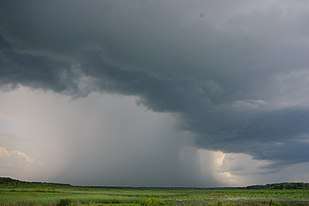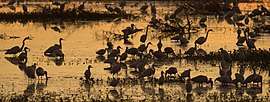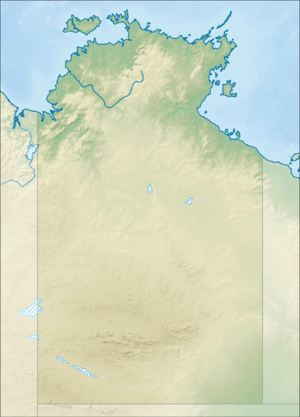Fogg Dam Conservation Reserve
The Fogg Dam Conservation Reserve is a protected area consisting of a wetland area approximately 70 km (43 mi) east of Darwin in the Northern Territory of Australia. It lies within the Adelaide and Mary River Floodplains, which is an Important Bird Area.
| Fogg Dam Conservation Reserve Middle Point[1], Northern Territory | |
|---|---|
IUCN category V (protected landscape/seascape)[2] | |
 Fogg Dam during the Build-Up | |
 Silhouetted birds at sunrise at Fogg Dam around July–August | |
 Fogg Dam Conservation Reserve | |
| Nearest town or city | Humpty Doo |
| Coordinates | 12°33′59″S 131°18′5″E |
| Established | 13 August 1982[3] |
| Area | 37.08 square kilometres (14.32 sq mi)[2] |
| Visitation | 63,200 (in 2017)[4] |
| Managing authorities | Parks and Wildlife Commission of the Northern Territory |
| Website | Fogg Dam Conservation Reserve |
| See also | Protected areas of the Northern Territory |
It attracts a wide range of local and migratory water birds and other wildlife including one of the largest populations of snakes within Australia (including the Water Python and Death Adder), and includes several raised observation platforms.
Saltwater Crocodiles (Crocodylus porosus) and Freshwater Crocodiles (Crocodylus johnstoni) can be seen at Fogg Dam all year around. Fogg Dam is open 24/7/365.
Species lists
.jpg)
Birds of Banks and Sky
| Type | Common name | Scientific name |
|---|---|---|
| Finches | Crimson Finch | Neochmia phaeton |
| Marshbirds | White-browed Crake | Amaurornis cinerea or Porzana cinerea |
| Raptors | White bellied Sea Eagle | Haliaeetus leucogaster |
| Raptors | Whistling Kite | Haliastur sphenurus |
| Seabirds | Whiskered Tern | Chlidonias hybrida or Chlidonias hybridus |
| Waders | Little Curlew | Numenius minutus |
| Waders | Australian Pratincole | Stiltia isabella |
| Waders | Masked Lapwing | Vanellus miles |
| Warblers | Golden-headed Cisticola | Cisticola exilis |
| Waterbirds | Nankeen Night Heron | Nycticorax caledonicus |
.jpg)
Birds of Grassed Shallows
| Type | Common name | Scientific name |
|---|---|---|
| Waterbirds | B Cattle Egret | Ardea ibis |
| Waterbirds | Australian White Ibis | Threskiornis moluccus |
| Waterbirds | Glossy Ibis | Plegadis falcinellus |
| Waterbirds | Straw-necked Ibis | Threskiornis spinicollis |
| Waterbirds | Black-necked Stork or Jabiru | Ephippiorhynchus asiaticus |
| Waterbirds | Brolga | Grus rubicunda |
| Waterfowl | Magpie Geese | Anseranas semipalmata |
.jpg)
Birds of Lilied Shallows
| Type | Common name | Scientific name |
|---|---|---|
| Marshbirds | Black-winged Stilt, Common Stilt, or Pied Stilt | Himantopus himantopus |
| Marshbirds | Comb-crested Jacana or Lilytrotter | Irediparra gallinacea |
| Waterbirds | Intermediate Egret | Mesophoyx intermedia |
| Waterbirds | Royal Spoonbill | Platalea regia |
| Waterbirds | Yellow-billed Spoonbill | Platalea flavipes |
| Waterbirds | Little Egret or Lesser Egret | Egretta garzetta immaculata |
| Waterbirds | Pied Heron | Ardea picata or Egretta picata |
| Waterbirds | Great Egret or Great White | Ardea alba |
.jpg)
Birds of Open Water
| Type | Common name | Scientific name |
|---|---|---|
| Seabird | Little Black Cormorant | Phalacrocorax sulcirostris |
| Seabird | Little Pied Cormorant | Phalacrocorax melanoleucos |
| Seabird | Darter | Anhinga melanogaster |
| Seabird | Australian Pelican | Pelecanus conspicillatus |
| Waterfowl | Green Pygmy-goose | Nettapus pulchellus |
| Waterfowl | Plumed Whistling Duck | Dendrocygna eytoni |
| Waterfowl | Wandering Whistling Duck | Dendrocygna arcuata |
| Waterfowl | Pacific Black Duck | Anas superciliosa |
| Type | Common name | Scientific name |
|---|---|---|
| Koel | Eastern Koel | Eudynamys orientalis |
| Bee-eater | Rainbow Bee-eater | Merops ornatus |
| Honeyeater | Blue-faced Honeyeater | Entomyzon cyanotis |
| A Honeyeater | Dusky Honeyeater | Myzomela obscura |
| A Honeyeater | Rufous-banded Honeyeater | Conopophila albogularis |
| Honeyeater | Rufous-throated Honeyeater | Conopophila rufogularis |
| Wagtail | Willie Wagtail | Rhipidura leucophrys |
| Kingfisher | Forest Kingfisher | Todiramphus macleayii |
| Chat | Yellow Chat | Epthianura crocea |
gollark: Oh, conspicuously, that's what I mean.
gollark: So what do you actually hope to gain by confusingly and quite noticeably refusing to mention the existence of esoserver?
gollark: As far as I know most discussion and invitation to esoserver happened over DMs anyway.
gollark: You're quite literally metaphorically acting like a repressive authoritarian government (I mean, not torturing people and such, but denying the existence of opposition, thinking you're the only one who can save the people from themselves, censoring anything (invites) which *might be* opposition), except with less power since you can't stop people directly communicating with each other.
gollark: That would probably not have helped.
References
- "Place Names Register Extract for "Fogg Dam Conservation Reserve"". NT Place Names Register. Northern Territory Government. Retrieved 4 May 2019.
- "Terrestrial Protected Areas by Reserve Type in the Northern Territory (2012)". Department of Environment. 2012. Retrieved 10 April 2015.
- "Place Names Register Extract". Northern Territory Land Information System. Northern Territory Government. Retrieved 3 June 2011.
- "Park visitor data". Department of Tourism Sport and Culture. Northern Territory Government. Retrieved 20 April 2019.
Traffic counters located at entry point.
Further reading
- Pizzatto, Ligia; Somaweera, Ruchira (2013). Fogg dam, How scientists see nature (PDF). ISBN 978-0-9873095-0-1.
External links
| Wikimedia Commons has media related to Fogg Dam Conservation Reserve. |
| Wikivoyage has a travel guide for Fogg Dam Conservation Reserve. |
This article is issued from Wikipedia. The text is licensed under Creative Commons - Attribution - Sharealike. Additional terms may apply for the media files.